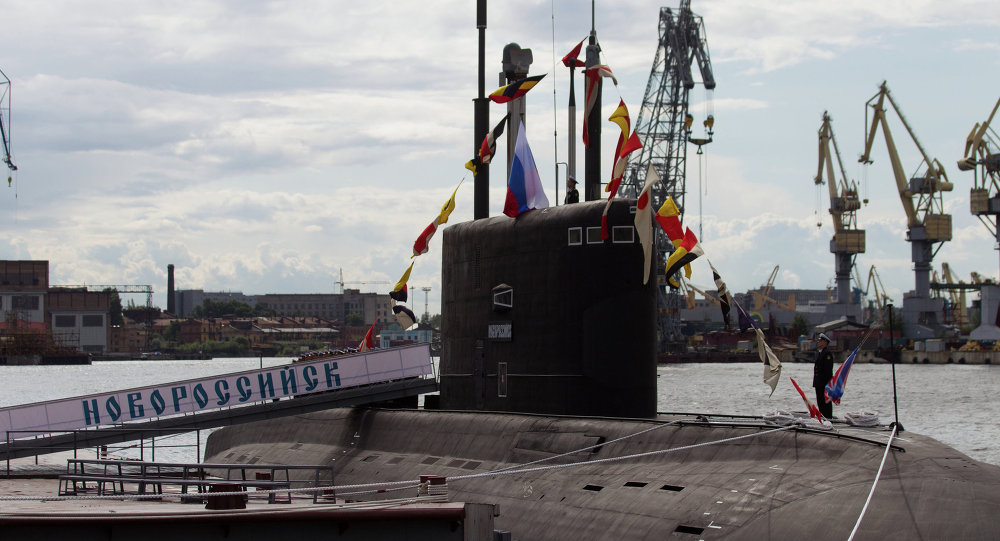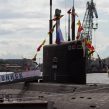
Spain’s African Exclave of Ceuta: Mainstay of the Russian Navy in the Mediterranean?
Publication: Eurasia Daily Monitor Volume: 12 Issue: 157
By:

On August 5, 2015, four Russian warships—the missile cruiser Moskva, the escort ship Pytlivy, the large sea tanker Ivan Bubnov and Shakhtyor, a rescue tug—docked at the Mediterranean port of Ceuta, a Spanish exclave in North Africa, claimed by Morocco, and located just south of Gibraltar, across the Strait (Gibraltarpanorama.gi, August 6, 2015). This port visit was followed, on August 26, by the arrival of the diesel-electric submarine Novorossiysk and, one day later, an SB-36-class tugboat (Laverdaddeceuta.com, August 26, 2015). This marks the 12th such port visit this year; 13 took place over all of 2014. Russian warships bunker and take water and other supplies at Ceuta, while their crews enjoy shore leave.
The regular arrival of Russian naval vessels at Ceuta contributes significantly to the local economy and used to be openly reported on by the local press, including outlets such as Pueblo de Ceuta and La Verdad de Ceuta. But the August 5 port call marked the first time that Ceuta’s local press failed to report on the warship visit, which, on the other hand, received coverage in Russia’s press agency TASS (TASS, August 5). Moreover, the August 25 visit appeared in La Verdad de Ceuta, but not Pueblo de Ceuta. Gibraltarian and Russian media have covered many of the visits but Spain’s main Madrid-based newspapers—such as ABC, El País and El Mundo—refrain from doing so. Spanish think tanks like the Royal Elcano Institute never mention Russia’s naval presence in Ceuta in their reports on the European Union’s relations with Russia or bilateral Spanish-Russian relations. For example, the word “Ceuta” did not feature in its February 2015 paper on Ukraine and Russia’s confrontation with the West (Realinstitutoelcano.org, February 4).
Although Russia’s aggression against Ukraine has seriously damaged Russian relations with many, if not all, European countries, the Ukraine crisis has apparently not affected Ceuta’s role in the Russian Navy’s blue water operations. Indeed, over the last few years, this North African coastal city has become the Russian Navy’s most important logistical base in the Western Mediterranean and Eastern Atlantic. This has allowed Russia to expand its naval presence in a sensitive area, as part of Moscow’s policy of demonstrating a worldwide military presence and openly challenging the North Atlantic Treaty Organization (NATO). When the Ukraine crisis first began, Spanish leaders openly spoke out against the takeover of Crimea, with Foreign Minister Garcia-Margallo saying, on March 17, 2014, that the parallel with Catalonia was “absolute,” adding that a referendum that violated an internal constitution by definition violated international law and could not have legal effects (Abc.es, March 17, 2014). And though Catalan leaders, such as Marc Guerrero, refused such comparisons with their political aspirations for Catalonia, they, too, rejected the legitimacy of Crimea’s annexation (Ceec.cat, April 10, 2014; NPR, March 22, 2014).
Nevertheless, Madrid then quickly reverted to its traditional, pragmatic and accommodating stance toward Moscow. Periodic Russian naval visits to Ceuta have continued, even while the EU and Russia passed countervailing economic sanctions against one another and NATO laid down restrictions on military contacts with Moscow. Luke Coffey and Daniel Kochis, Margaret Thatcher fellows at The Heritage Foundation, have criticized Spain’s ongoing allowance of its port facility to Russia, calling it “unacceptable” for “major NATO member states” to “offer support to the Russian navy at a time when Moscow is actively attempting to dismember Ukraine and undermining the security of the Baltic states.” The two scholars urged the White House, the Pentagon and the United States Congress to press Madrid to suspend such practices (Heritage.org, May 20, 2014). Writing in June 2015, Fernando Betancor, a Madrid-based American economist and formerly of the US Army, underlined that “The Straits of Gibraltar are a vital shipping route and having Russian warships a familiar sight in those waters isn’t something NATO should be happy about.” He added that those Russian ships would be well positioned to attack British naval and air facilities in Gibraltar (17 miles away) by surprise. Betancor doubts Spain’s commitment to Article V of the NATO Treaty should “little green men” enter the Baltics states (Fdbetancor.com, June 22).
Spain’s geographical location, at the crossroads between the Atlantic and the Mediterranean, and between Africa and Europe, means that as Russia seeks to recover its navy’s global reach, Moscow is likely to have a powerful incentive to keep in place current pragmatic arrangements with Madrid, including continued access to Ceuta. In fact, one of the goals stated in Russia’s 2015 Maritime Doctrine is to guarantee a permanent presence in the Mediterranean (Kremlin.ru, Jul 26; see EDM, August 11).
While Washington and NATO may try to press Madrid, Moscow retains a number of cards up its sleeve. These include the continued presence in Russia of politically well-connected Spanish companies like Repsol, Talgo and Iberdrola, as well as the possible extension of Russian sanctions on the import of European wine and olive oil. In particular, olive production is centered in Spain’s politically powerful south. Moreover, petroleum company Repsol, in partnership with the Russian firm NNK, has produced 14,600 equivalent barrels of oil per day in Russia, in 2014, announcing two hydrocarbon discoveries in the Karabashsky 1 and 2 blocks in Western Siberia. According to Repsol, these could add 240 million barrels to its reserve tally. Russian Minister of Natural Resources and Environment Sergei Donskoi called it the biggest find in Russia over the previous two years (Repsol.com, May 11). In 2011, train manufacturer Talgo won a 100 million euro ($112 million) contract for seven train sets, the first being inaugurated on June 1, 2015 (Railwaygazette.com, June 3). And in 2014, Iberdrola Ingenieria built a 500-kilovolt gas insulated switchgear (GIS) substation for the 1,020-Megawatt Votkinskaya hydro-power station—a turnkey project for RusHydro worth 32 million euros ($36 million) (Futurenergyweb.es, April 21, 2014).
After the end of the Cold War, Moscow lost access to many of the foreign bases and port facilities that its Armed Forces had relied on to project power globally. Thus, continued access to the Spanish port of Ceuta is vital to support Russia’s ability to maintain its naval presence in the Western Mediterranean and the northeast Atlantic. Moscow is bound to use all the economic leverage at its disposal to keep this port open to Russian warships for the foreseeable future.




